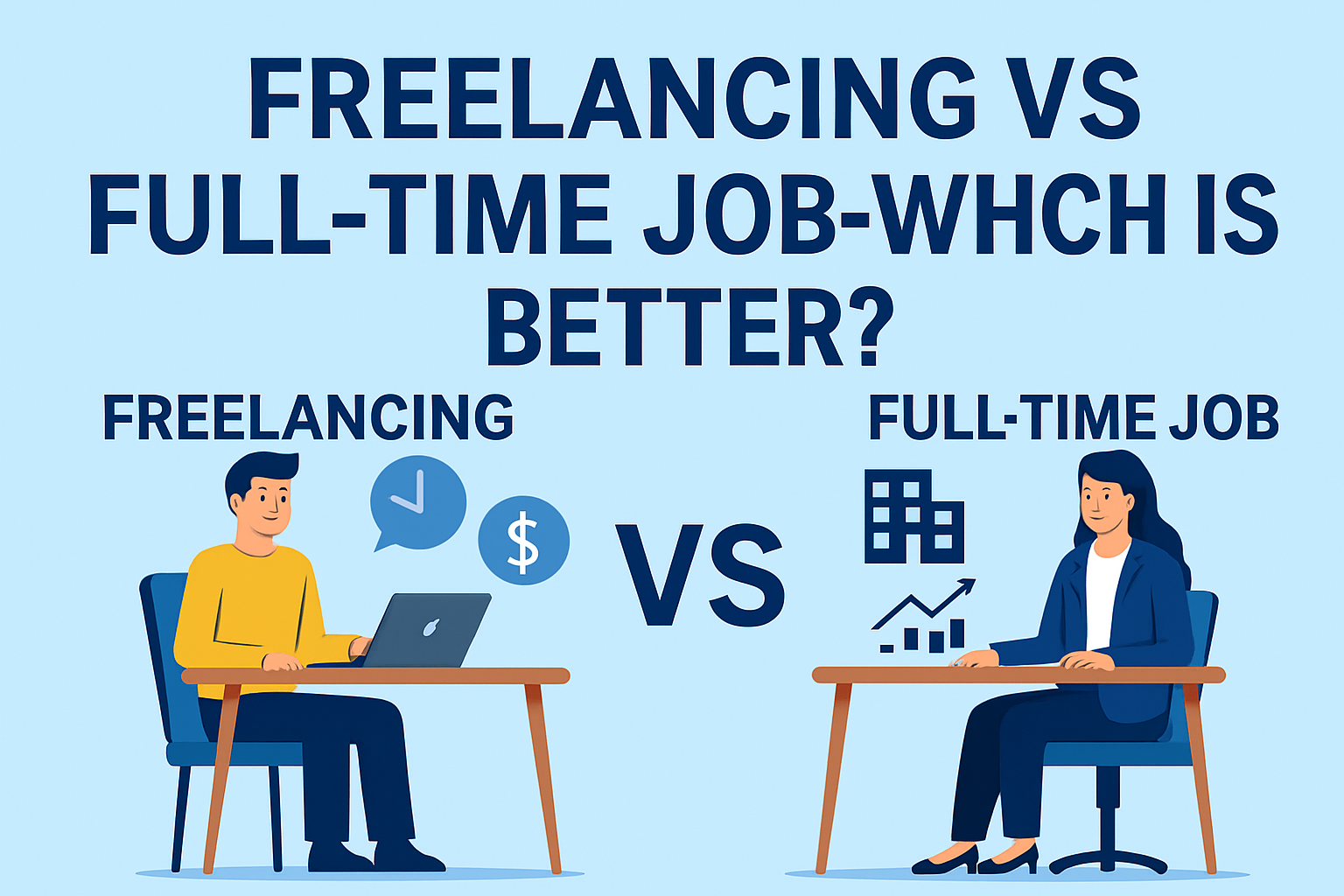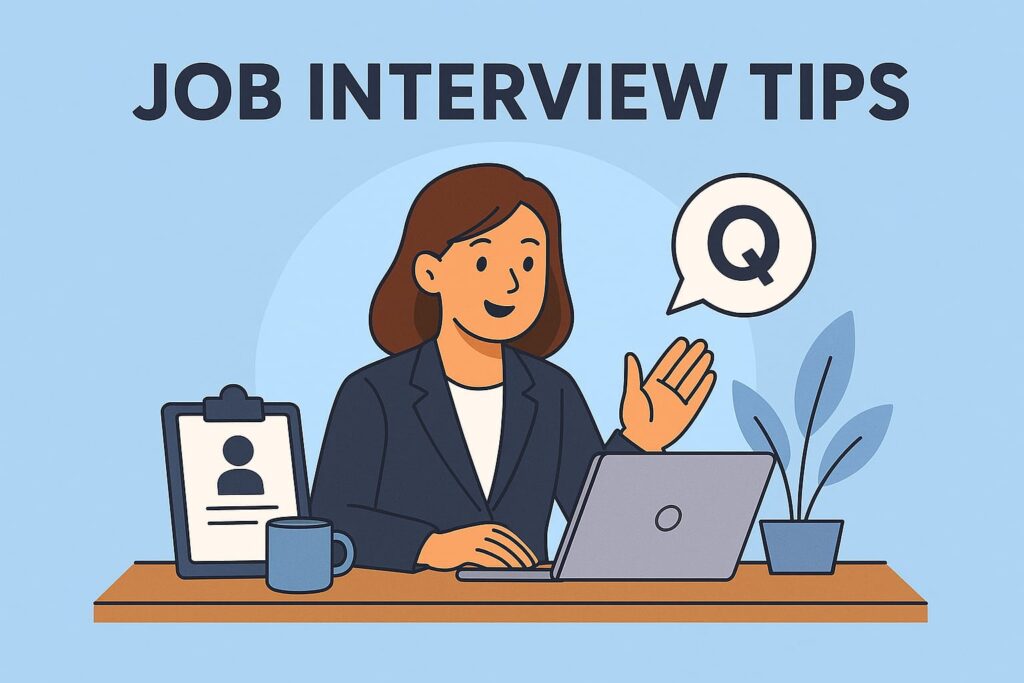In the ever-evolving landscape of the 2020s, the way we work has transformed dramatically. From the traditional 9-to-5 office setup to the rise of the digital nomad lifestyle, professionals today have more choices than ever when it comes to how—and where—they earn a living. This shift has sparked an ongoing debate: freelancing vs full-time job – which is better for long-term career growth, financial stability, and personal satisfaction?
Before diving into comparisons, it’s important to understand what each path truly involves. Freelancing is a self-employed work model where individuals offer services to multiple clients on a project or contract basis. Freelancers enjoy flexibility, autonomy, and the freedom to choose their own schedules, but they also face challenges like inconsistent income and lack of employee benefits.
On the other hand, a full-time job typically involves working for a single employer under a fixed contract. This setup provides stable income, structured career growth, and benefits such as health insurance and paid leave. However, it often comes with limited flexibility and a fixed routine that can lead to burnout or reduced creativity over time.
As more people explore non-traditional work options, one critical question remains: freelancing vs full-time job – which is better for you personally? The answer depends on various factors such as your goals, risk tolerance, financial needs, and preferred lifestyle. In this article, we’ll explore the pros and cons of both models, highlight key differences, and help you make an informed decision based on your unique situation.
Whether you’re a fresh graduate, a mid-career professional, or someone considering a career switch, understanding the core differences can empower you to choose the path that aligns with your future vision.
- What is Freelancing?
- What is a Full-Time Job?
- Freelancing vs Full-Time Job – Key Differences
- Which is Better for You? – Self-Assessment Guide
- Real-Life Examples & Case Studies
- Future of Work – Freelancing or Full-Time?
- Final Verdict – Freelancing vs Full-Time Job
- FAQs – People Also Ask
- Key Takeaways
- Conclusion
What is Freelancing?
Freelancing is a self-employment model where individuals offer their services to multiple clients, usually on a project or contract basis. Unlike traditional jobs, freelancers are not bound to a single employer or fixed schedule.
Common Freelancing Industries
- Content writing and copywriting
- Graphic design and illustration
- Web and app development
- Digital marketing and SEO
- Video editing and animation
- Virtual assistance and customer support
Popular Freelancing Platforms
- Upwork – ideal for professionals across many fields
- Fiverr – best for creative gigs and small services
- Freelancer.com – suitable for competitive bidding
- Toptal – for high-end freelance developers and designers
Pros of Freelancing
- Flexible working hours – work when you’re most productive
- Better work-life balance – more time for personal activities
- Control over clients and projects – choose what you love
- Location independence – work from anywhere in the world
Cons of Freelancing
- Inconsistent income – no fixed monthly salary
- Lack of job security – clients may come and go
- No employee benefits – no insurance or paid leave
- Requires self-discipline – manage your own time and tasks
In the debate of freelancing vs full-time job – which is better, freelancing offers unmatched freedom, but it comes with responsibility and financial unpredictability. It’s ideal for self-starters who value flexibility over routine.
What is a Full-Time Job?
A full-time job typically refers to employment where an individual works around 35–40 hours per week under a fixed contract with one employer. It involves a structured routine, consistent responsibilities, and a clear reporting hierarchy.
Typical Structure
- Fixed working hours – usually 9 to 5, Monday to Friday
- Defined roles – tasks and responsibilities are pre-assigned
- Managerial oversight – employees report to supervisors or team leads
Types of Full-Time Jobs
- Corporate jobs – roles in companies such as marketing, HR, sales
- Government jobs – civil services, education, healthcare
- Private sector jobs – in startups, tech firms, and industries
Pros of Full-Time Jobs
- Stable income and benefits – fixed salary, health insurance, retirement plans
- Career growth opportunities – chances of promotion and training
- Structured work environment – clarity in expectations and goals
- Social interaction – teamwork, office culture, and collaboration
Cons of Full-Time Jobs
- Limited flexibility – fixed hours, little room for personal errands
- Commute stress – daily travel to and from office
- Work-life imbalance – can lead to burnout
- Less creative freedom – rigid systems may restrict innovation
When deciding freelancing vs full-time job – which is better, a full-time job is ideal for those who prefer security, stability, and predictable routines. However, it may not suit individuals seeking autonomy and flexibility.
Freelancing vs Full-Time Job – Key Differences
When considering freelancing vs full-time job – which is better, it’s essential to break down the major differences that can impact your career and lifestyle. Here’s a detailed comparison based on key factors:
Work-Life Balance
- Freelancing: Offers greater flexibility. You can set your own hours and take breaks when needed.
- Full-Time Job: Fixed schedules can make it hard to balance personal life, especially with long commutes.
Income Potential
- Freelancing: Income can be high with multiple clients, but it’s often inconsistent.
- Full-Time Job: Provides stable monthly income, but with fixed growth limits.
Career Growth
- Freelancing: Limited structured promotions, but you can grow by building your brand or agency.
- Full-Time Job: Defined paths for promotions, raises, and leadership roles.
Skill Development
- Freelancing: Learn diverse skills across various projects.
- Full-Time Job: Focused skill growth, often tied to one role or department.
Job Security and Stability
- Freelancing: Unpredictable, no long-term guarantees.
- Full-Time Job: Stable, with long-term contracts and benefits.
H3: Mental and Physical Health
- Freelancing: Can reduce stress with flexibility, but isolation is common.
- Full-Time Job: Offers routine and structure, but may cause burnout.
“Choose a job you love, and you will never have to work a day in your life.” – Confucius
In summary, comparing freelancing vs full-time job – which is better really depends on your personal goals, financial needs, and work preferences.
Which is Better for You? – Self-Assessment Guide
Choosing between freelancing and a full-time job is a personal decision that depends on your lifestyle, goals, and mindset. If you’re wondering freelancing vs full-time job – which is better, the best place to start is by evaluating your own preferences and circumstances.
Ask yourself the following questions to find out which path suits you best:
Do you prefer flexibility or stability?
- If you value control over your schedule and love the idea of working from anywhere, freelancing might be for you.
- If you find comfort in routine, steady hours, and a fixed paycheck, a full-time job offers that stability.
Are you financially disciplined?
- Freelancers need to manage irregular income, save for taxes, and build emergency funds.
- Full-time employees benefit from regular paychecks and employer-covered benefits.
Do you thrive in structure or independence?
- Freelancing demands self-motivation, time management, and the ability to work solo.
- Full-time jobs provide guidance, team collaboration, and clearly defined goals.
How important are benefits to you?
- Full-time roles often include health insurance, paid leave, and retirement plans.
- Freelancers must secure and manage these on their own.
In short, when weighing freelancing vs full-time job – which is better, the answer lies within your personality, priorities, and willingness to take risks for freedom—or security.
Real-Life Examples & Case Studies
Understanding real experiences can help you decide freelancing vs full-time job – which is better? Let’s look at two actual career paths—one of a successful freelancer, and the other of a corporate professional.
Freelancer Success Story: A Tech Writer’s Journey
Sarah, a former full-time technical writer, transitioned to freelancing in 2019. Tired of the office routine and daily commute, she decided to offer her writing skills on platforms like Upwork and LinkedIn.
Within a year, she built a steady client base, doubled her income, and began working from various locations worldwide. She enjoys:
- Choosing projects she’s passionate about
- Earning on her own terms
- A flexible schedule that supports travel and family time
However, Sarah also faced challenges like setting her own rates, managing deadlines, and covering her own insurance. But for her, the freedom outweighs the risks.
Corporate Employee Journey: From Associate to Manager
Amit, on the other hand, joined a multinational company right after graduation. Over 8 years, he moved from an entry-level analyst to a senior project manager.
His growth was supported by:
- In-house training programs
- Mentorship from senior leaders
- Company-sponsored certifications
He enjoys the structure, job security, and leadership opportunities a full-time job offers.
These stories highlight that in the debate of freelancing vs full-time job – which is better, the answer depends on your personality, priorities, and professional goals.
Future of Work – Freelancing or Full-Time?
As we move deeper into the digital age, the professional landscape is evolving rapidly. The question freelancing vs full-time job – which is better? is more relevant than ever, especially with the rise of remote work, automation, and global talent networks.
Trends in Remote Work and Hybrid Models
- The COVID-19 pandemic permanently changed how companies operate.
- Many organizations now offer remote or hybrid work options, blending flexibility with structure.
- This shift benefits freelancers and full-time employees alike, offering more control over how and where people work.
Gig Economy Growth
- The gig economy is booming, with millions choosing freelance work for its independence and variety.
- Platforms like Fiverr, Upwork, and Toptal are seeing record growth in user activity.
- Experts predict that by 2030, freelancers could make up over 50% of the global workforce.
What Companies Prefer in 2025 and Beyond
- Many businesses now hire freelancers for short-term, specialized tasks, reducing overhead costs.
- However, full-time employees are still preferred for roles requiring long-term commitment, leadership, or deep product knowledge.
- Companies are adopting blended teams—a mix of freelancers and full-timers for optimal efficiency.
In conclusion, the line between freelancing and full-time is blurring. When asking freelancing vs full-time job – which is better, the answer increasingly depends on flexibility, industry trends, and how work fits into your life in this new era.
Final Verdict – Freelancing vs Full-Time Job
Choosing between freelancing and a full-time job is a personal decision shaped by your goals, personality, and lifestyle. If you’ve been wondering freelancing vs full-time job – which is better, here’s a quick summary to help you decide.
Summary of Pros and Cons
| Aspect | Freelancing | Full-Time Job |
|---|---|---|
| Flexibility | High flexibility | Fixed schedule |
| Income Stability | Variable, project-based | Stable, fixed salary |
| Job Security | Low, no guaranteed contracts | High, with employee benefits |
| Career Growth | Self-driven, entrepreneurial | Structured promotions |
| Work Environment | Independent, remote | Team-based, office or hybrid |
Who Should Choose Freelancing?
- Those who value flexibility and want to be their own boss
- Individuals comfortable with financial uncertainty
- People who enjoy working on diverse projects and managing clients
- Professionals seeking location independence and work-life balance
Who Should Stick to Full-Time Employment?
- Those who prefer stability and predictable income
- Individuals who thrive in structured environments with clear growth paths
- People who value employee benefits like health insurance and paid leave
- Professionals who enjoy teamwork and regular social interaction
In the end, the answer to freelancing vs full-time job – which is better depends on your unique preferences and career goals. Both paths have their merits, and success comes from aligning your choice with what fits your life best.
FAQs – People Also Ask
Key Takeaways
- Freelancing offers flexibility, control, and location independence, making it ideal for those who value freedom over routine.
- Full-time jobs provide stability, steady income, and career growth opportunities with structured environments and employee benefits.
- When deciding freelancing vs full-time job – which is better, consider your financial discipline, work preferences, and long-term goals.
- The future of work is shifting towards hybrid models, blending freelancing and full-time roles, so adaptability is key.
- Success in either path depends on aligning your choice with your personality, priorities, and lifestyle demands.
Conclusion
The ongoing debate of freelancing vs full-time job – which is better doesn’t have a one-size-fits-all answer. Both career paths come with unique advantages and challenges that suit different personalities and life situations. Freelancing offers unmatched freedom and flexibility, perfect for those who value autonomy and variety. On the other hand, full-time jobs provide financial stability, career growth, and structured support, ideal for individuals seeking security and clear progression.
As the future of work evolves with remote and hybrid models gaining traction, many professionals are blending both worlds to create a balanced career. Ultimately, the best choice depends on your personal goals, financial discipline, and what environment helps you thrive.
Carefully assessing your priorities with the self-assessment guide in this article can help you make a confident decision. Whether you choose freelancing or a full-time job, success comes from commitment, continuous learning, and aligning your work with your passion.
Remember, it’s not about which path is objectively better, but which one is better for you.



